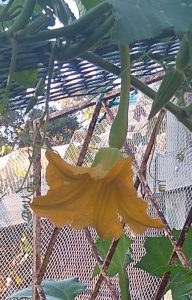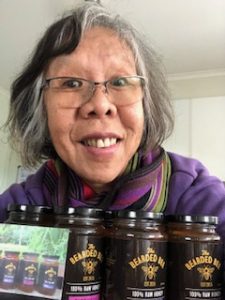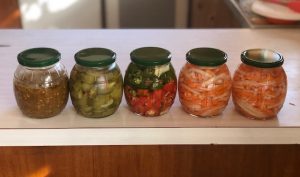Thanks to the people who have contributed to this week’s newsletter: Angelo Eliades, Deb Graham, Heather, Helen Bloustein, Jan Akeroyd, Judith Chivers, Katrina Forstner, Lyn Richards, Mala Plymin and Morgan Koegel.
Every newsletter needs a good picture
 This is by someone called Alex Jefferies. It actually looks exactly like the boy next door when I was growing up.
This is by someone called Alex Jefferies. It actually looks exactly like the boy next door when I was growing up.
Farmers’ market news
Of the 6 farmers’ markets that would usually be happening this upcoming weekend, it looks like 2 (Coburg and Eltham) will go ahead, 2 (Croydon and Whitehorse) have been cancelled and 2 (Alphington and Collingwood Children’s Farm) have been merged. The merged market will take placed on the day and time of the Collingwood Children’s Farm market but at the location of the Alphington market.
Melbourne Farmers’ Markets, who run the Abbotsford, Alphington, Carlton, Coburg and Collingwood farmers’ markets, have opened an online shop on the Open Food Network whereby you can order food online from their stallholders for pickup in Alphington (2 Wingrove Street). The timetable is twice weekly:
- You place your order by 2pm on the Monday and you pick up your order on the Wednesday from 3pm.
- You place your order by 2pm on the Thursday and you pick up your order on the Sunday from 3pm.
Shop at the Melbourne Farmers’ Markets’ online shop.
3000acres discuss the barriers to homegrown resilience
This month’s contribution is from Morgan Koegel.
There’s been a massive surge in interest in home food growing thanks to the recent crisis. From empty Bunnings shelves to Diggers closing their seed orders, people are thinking about growing food at home as an act of personal resilience. While this renewed interest could be a good sign for the continued growth of urban agriculture, we at 3000acres have been thinking about the barriers to growing success now that time is less of a factor.
Knowledge: With lots of people more disconnected from how their food is grown than ever before, first time gardeners have a steep learning curve. We’ve noticed lots of questions coming in that show people are starting to get their heads around things like soil fertility, seasonality and sun access for the first time. Without this knowledge, there is a risk that a ‘disappointment effect’ sets in and people stop trying to grow food after an initial failed attempt.
Resources: All food growers know that a lot of inputs are needed for a great harvest, including good soil and compost as well as seeds and seedlings. Other than some of these inputs being scarce at the moment, and financially inaccessible for some, generating them at a home level takes time. People starting composts and worm farms now is good but it will be some time before they can benefit from the end product. For us, this demonstrates the need for the localisation of these resources: community composts rather than food waste travelling far away; and seed libraries that are community run.
Space to grow: In urban areas, average backyard size has continued to shrink. In addition, more and more people’s residency is more transient through renting. Plus higher buildings packed more tightly has resulted in limited solar access for many properties. With these limitations, it is essential that we collectively think creatively about shared spaces where people can still connect with food. At 3000acres, we’ve seen an increase in interest in plots at the community gardens that we manage since the lockdown began, with people looking for a destination outside of their apartment that is non-commercial in nature. Coming out of the crisis, we think that there will be a need to invest in high quality communal growing spaces that can bring people together when safe to do so, and provide a respite for those otherwise without any place to get their hands dirty.
The current crisis is an opportunity to reflect on a lot of aspects of how we live our day-to-day lives, including how communities access essential things such as food. Both individuals and governments – local all the way up to federal – could usefully contemplate on what can changes could help people feel more resilient, communities feel more connected and our country more prepared for future uncertainty.
Want to try and win some money for your community garden?
The deadline for submitting an entry to The State Government’s Back to the Earth Initiative has been extended from 27th March to 17th April.
Yes, you did know!
Last week, Richard Lee asked for advice on what African vegetables to plant. Heather has two suggestions: “Okra has been planted by an African resident at a community garden I work at in Burwood and is doing very well. [Editor: also see this Facebook post about Ajak, an okra farmer in Coburg.] Second, teff is a grain used to make artisan bakery foods, including Injera, a traditional bread in the Horn of Africa.“
Also last week, Keryn Johnson asked whether she should try and grow a mango tree from a seed from a tree in Brunswick. Guy Palmer’s reply: “if it is the fruit that you are after, I think you would be wasting your time but, as an experiment, I think it could be quite interesting. I have both avocado trees and banana plants. With quite a lot of effort on my part (e.g. shade cloth in both Winter and Summer), these plants now thrive, and they even have baby fruit, but the fruit never mature and ripen. My understanding is that mangoes are even more difficult to achieve success with in Melbourne. However, they are included as a possible in Louis Glowinski’s book.“
Angelo Eliades points out another problem: the mango seed is likely to be fertilised and thus its DNA will be a combination of both of its parents rather than a clone of its mother. So, for example, just because the mother plant is hardy enough to survive in Melbourne doesn’t mean that the seed will be. More generally, it is because most fruit trees don’t grow true to seed that they are usually propagated by grafting or cutting rather than by seed. Putting this another way, if you plant a seed from a Granny Smith apple, you might well get an apple tree but it certainly won’t be a Granny Smith apple tree. And, indeed, all the Granny Smith apple trees throughout the world have originated by grafting or cutting from a single chance Australian seedling from 1868.
Finally, Angelo points out that, if Keryn decides to plant the seed, she can find mango seed planting instructions on The Western Australian Government website.
Do you know?
Margot Meredith says that she can’t currently find bakers flour, or just about any other flour, in any shops. She asks whether you know of anywhere where she can buy flour, especially bakers flour?
Want to know about native bees?
Katrina Forstner, aka Buzz & Dig, has sent in two videos: one on how to make your garden attractive to native bees and the other on how to make hotels for native bees. Thanks, Katrina! I’ve taken the liberty of adding a third video, which is Katrina singing a song about native bees.
Grow your own food – mushrooms
Most mushrooms can be grown at home indoors from mushroom kits. This includes lions mane, oyster and shimeji. But perhaps the easiest one to start with is the common edible mushroom, Agaricus bisporus.
Local food producer The Mushroom Shed, from Montmorency, sell kits for two varieties of the common edible mushroom, namely swiss brown and white button. The kits are $22.50 each, or $40 for two. They usually sell these kits at Eltham Farmers’ Market and other markets. But they recognise that not everyone can currently go to markets, so they are now offering both a delivery and a postal option. Delivery is available to people in Eltham, Eltham North, Greensborough, Lower Plenty, Montmorency and Research. To arrange, please contact Helen by email (hsimpson1@optusnet.com.au). They can also deliver veggie seedlings, herbs and seeds for orders over $30 – please talk to Helen for a list of available produce. There is no delivery charge.
For people living elsewhere in Melbourne or Victoria, the kits can be posted. To arrange and obtain a postage cost, please contact Helen by email (hsimpson1@optusnet.com.au).
Urban Farming Collective, from Heidelberg Heights, have also started selling swiss brown mushroom kits online. And they are also selling oyster mushroom kits online.
New food delivery options
Monty Fresh Produce, who are a greengrocer based in Montmorency, are doing free delivery of fruit and vegetables for orders over $30 to postcodes 3083, 3084, 3085, 3087, 3088, 3089, 3090, 3091, 3093, 3094, 3095, 3752, 3754, 3085 and 3757.
Hurstbridge Deli and Larder, who are a deli based in Hurstbridge, will take phone orders (9718 1034) and deliver.
AVS Organic Foods, who are based in Watsonia North, are offering free local home delivery for orders over $60. Order online.
Blue Pear Pantry, who are based in North Warrandyte, are offering free local home delivery. They have extended their offering to include potato gems and fries.
Bakers Delight in Eltham are offering a home delivery service to “all our elderly, disabled and mobility-restricted locals” plus “who are self isolating or just restricting their movements“. Ring them on 9439 4284 by 11am Monday to Friday.
Aangan Indian Restaurant in Bundoora (1191 Plenty Road) is offering free takeaway meals for Seniors. Meals are limited to one per person, and are being offered between 5pm-6.30pm. Phone 8383 3355.
Thanks for the info, Jan Akeroyd, Lyn Richards and Judith Chivers.
Which cafes etc are open for takeaway in your suburb?
Warrandyte
- Cocoa Moon (tel: 9844 5081).
- Ember Dining (tel: 9844 5548).
- Food For All Seasons (tel: 9844 2780).
- The Grand Hotel Warrandyte (tel: 9844 3202).
- River View Deli Cafe (tel: 9844 3337).
- The White Owl (tel: 9844 5124).
Thanks for the info, Deb Graham.
City of Yarra
Look at this map. Thanks, Helen Bloustein.
A poem by Pam Jenkins
 Is that an angel’s trumpet?
Is that an angel’s trumpet?
No it’s a tromboncino.
I’ll serve it up as a tasty dish
Washed down with a glass of vino.
Read more local food poetry, including three others by Pam.
Some feedback from last week’s newsletter
A source of free food at Diamond Creek
Last week, we reported that The Rotary Club of Diamond Creek has partnered with SecondBite to give away free food every Saturday, from 9-11am, at Diamond Creek Church, 32 Wensley Street, Diamond Creek (opposite Aksorn Thai and the police station). Carol Woolcock decided to take a look: “There did not seem to be eligibility criteria. The staff urged us to take some of the produce as they were having to throw away what was left. As we are self isolating oldies, she collected a few each of nectarines, peaches, oranges, plums plus an onion and red capsicum and a bag of salad mix. I was impressed with the quality and  can’t believe these were destined for landfill by the contributing vendors.“
can’t believe these were destined for landfill by the contributing vendors.“
The Bearded Bee’s honey
Kim Riazi was one of the people who won a free jar of The Bearded Bee’s honey. As per the picture, it looks like she acquired multiple jars!
J.B. Shackleton’s marmalade
Chris Kent was one of the people who claimed his free jar of J.B. Shackleton’s marmalade. “I’ve just been fortunate to try some of J.B. Shackleton’s ‘Luxury Blood Orange Marmalade’ on my morning toast. It was very much to my liking; dark, thick-cut, slightly bitter. Quite firm and well set though, but at least not runny! This reflects the way I like my beer; dark and bitter. Actually it has given me an idea: if they make marmalade with whisky, so why not with Guinness? Maybe they do; I’ll have to find out!“
Lockdown pickles
 As shown in the photo, Mala Plymin has been making condiments from her homegrown veggies:
As shown in the photo, Mala Plymin has been making condiments from her homegrown veggies:
- Green chilli chutney: cooked with masala and local olive oil.
- Green tomato pickle: Italian style. This is one of Mala’s favourite pickles.
- Daikon radish and carrot: pickled Vietnamese style.
- Pickled chillies: Mala had left over vinegar mixture from the daikon radish pickle so experimented with pickled chillies.
Another article from Angelo Eliades
Angelo’s fourth article in his emergency survival prepper gardening series is entitled How to sow seeds directly into the ground and into seedling trays.
Watch this great video
It might be last but it’s certainly not least. Watch this video called The cake server. It is a video of “a Rube Goldberg machine to streamline dinnertime. It lets people keep eating, with no break before cake. Read Wikipedia’s page on Rube Goldberg machines.
The person who produced this machine and video, Joseph Herscher, has made around 100 of these videos. Look at his YouTube playlist.
Which link was clicked most times in the last newsletter?
Our website page of home delivery organisations by suburb/postcode.
Joke of the week
Why do we put round pizza in a square box and eat it in triangles?
